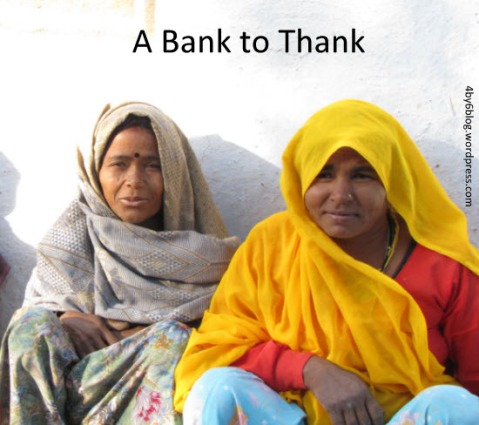A Bank to Thank
‘Tomato’ screamed the vegetable seller pushing his cart along on a sizzling hot day. This was in the heart of Bangalore metropolitan city and yet this scene from yonder is still a common sight. The ladies rushed to buy from this seller as this was literally home shopping of vegetables with cash on delivery (pun intended at all e-commerce stores in India that have copied the model of a vegetable/fruit seller). Now have you wondered how this vegetable seller’s business works? Its simple. He/She borrows money from a lender (on a same day repayment with high interest basis) in the morning. Buys the vegetable/fruit in bulk at the city market in the morning. Loads it onto his/her cart (rented or own) and then wheels it to sell vegetables/fruits around the town. Some customers pay them the asking price, some undercut their asking price. They sell their stuff, repay the money plus interest to the lender and take home enough money to feed their family. This is mostly the story for many of the small business that you find on the streets in India. It’s repeated every single day of their lives.
If you ask one of them what would it take for them to break this cycle, they would simply say if they had that everyday startup cash or could loan it with lesser interest or better repayment terms then their troubles would dissolve. Scheduled commercial banks don’t provide loans to these people as the people don’t have collateral/guarantee to take this loan against. Also the large banks have huge process in place and the processing fee incurred is sometimes more than the loan amount disbursed. Micro-finance institutions like SKS operate here but have a huge interest rate (like 20-25%) as these institutions themselves borrow from the state banks.
The large state banks have become exclusive organizations which take savings money from small account holders who have entrusted the bank with their life’s savings. In the quest of making more profits, these banks lend huge sum of money to huge business like industries, airlines etc. Some of these businesses have gone kaput (like Kingfisher Airlines). The Banks have to write these loans off despite the capability of the business owner to repay the loans. All because of the loopholes in the loan process that the business owner is making use of to get it termed as bad loan and conveniently escape. Thus adding the burden of bad loans to bank which increase its operating cost and pass it on to the end customer (the small savings account holder).
Also the individual account holder doesn’t have a choice to whom the bank should extend the loan to.
What if an account holder could make a choice. What if he/she could decide that the Bank should extend a small loan of Rupees 5000 to the vegetable vendor he/she transacts with everyday, maybe for a nominal interest rate (same or a little more than the savings account interest) and at the same time having earned some karma points for having helped another person in need (not in greed) in the society. Is this possible?
Yes. That’s where a social/micro credit comes in. There are some social/banking organizations (not Micro-finance institutions) that crowd-fund money from socially conscious investors and then lend small loans to small business/female entrepreneurs. Kiva in US and Rang De in India are institutions of repute that operate in this space. And the socially conscious investors get paid an interest rate similar to a savings account interest rate besides getting social good. By the way did you know that the repayment rates for these loans are as high as 98% way better than normal banks.
So the next time you want to park your dough in your savings account for a rainy day. Think again. While your dough is parked, it might help someone make their dough for their rainy day.


Trackbacks / Pingbacks